 | ||
 | ||
 | ||
 | ||
 | ||
 | ||
 | ||
 | ||
 | ||
 | ||
 | ||
 | ||
 | ||
 | ||
 | ||
 | ||
 | ||
 |
 |
 |
Shenandoah National Park
SKYLINE DRIVE
Virginia
 |
SKYLINE DRIVE TIMELINE OF DEVELOPMENTS | |
 | ||
| 1887 | George Freeman Pollock establishes Camp Stony Man (known today as Skyland), a resort in the Blue Ridge Mountains of Virginia. | |
| 1924 | The Southern Appalachian National Park Committee recommends Shenandoah and the Great Smoky Mountains as future eastern national park sites. | |
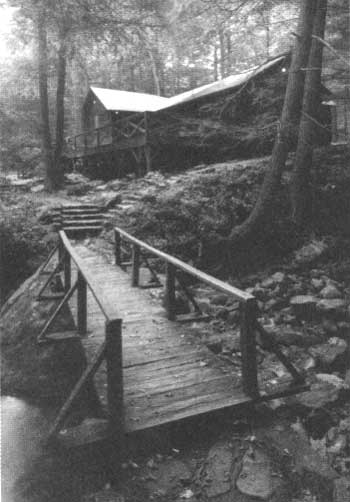
In 1929, President Herbert Hoover purchased land on the Rapidan River below Big Meadows for a private fishing camp and retreat known today as Camp Hoover. —Bill Faust. HAER 1996 | ||
| 1926 | Congress authorizes the establishment of Shenandoah and Great Smoky
Mountains National Parks if sufficient land is donated at the state
level. A cooperative agreement between NPS and BPR is signed, giving landscape engineers primary responsibility for landscape protection and design review of park road projects. | |
| 1930 | Both President and Mrs. Hoover are advocates for the new park. In late 1930, while horseback riding in Big Meadows Hoover tells NPS Director Albright to begin planning a scenic mountain drive. | |
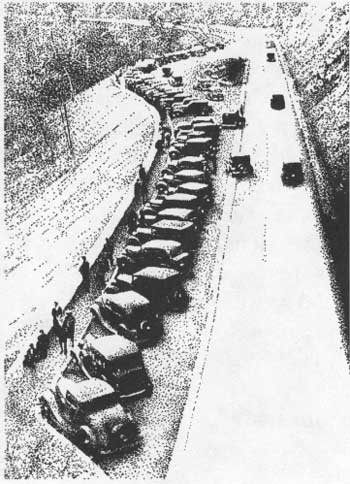
Skyline Drive was an immediate success, as this long line of cars at Marys Rock Tunnel Overlook in 1935 attests. By 1937, Shenandoah had become the first national park to attract 1 million visitors a year. —Michael Lanning, HAER, 1996. (adapted from SHEN photograph) | ||
| 1931 | Construction begins on Skyline Drive, as excavation and grading operations begin on the Rapidan Road from Camp Hoover to Big Meadows, later extending on the entire section from Thornton Gap to Swift Run Gap. | |
| 1933 | The Emergency Conservation Work Program (later called the CCC)
establishes camps at Shenandoah. NPS landscape architect Harvey Benson
supervises landscape work. Aug 12: President Roosevelt visits CCC camps and projects along the drive. NPS designers plan the junction of the proposed Blue Ridge Parkway and Skyline Drive. | |
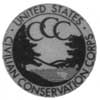 | ||
| 1934 | Virginia acquires the minimum amount of land necessary to establish
the park and delivers deeds to the U.S. Government. Work begins on the northern section of the drive between Front Royal and Thornton Gap. Construction also begins on tire Blue Ridge Parkway in North Carolina. Sept. 15: Skyline Drive opens between Thornton and Swift Run gaps. | |
| 1935 | The Secretary of the Interior accepts donation of 176,429 acres from the Commonwealth of Virginia, thus establishing Shenandoah National Park. | |
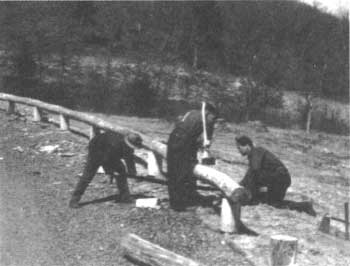
CCC crews built original guard rails of chestnut logs along the drives between 1936 and 1942, as part of the Emergency Conservation Work program in Shenandoah. —SHEN | ||
| 1936 | Construction begins on the northern most section of the Blue Ridge
Parkway between Jarman and Rockfish Gaps. April; Roadwork begins between
Swift Run and Brown Gaps. July 3: President Roosevelt dedicates
Shenandoah National Park at Big Meadows. October 1: North section of Skyline Drive opens. | |
| 1938 | Developed areas open at Dickey Ridge. Elkwallow and Big
Meadows. Construction begins on the final section between Black Rock and Jarman gaps and by year end the road base is in place from Brown to Jarman gaps. November: Paving operations are complete between Swift Run Gap and Brown Gap, and from Jarman Gap to Rockfish Gap on the Blue Ridge Parkway | |
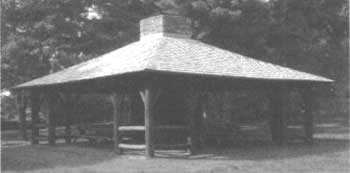
Picnic areas adjacent to the drive opened at Pinnacles (mile 36.7) and South River (mile 62.6) in 1935. Pinnacles' distinctive log shelter was built by the CCC. —Bill Faust, HAER, 1996 | ||
| 1939 | Between May and August: Pavement work from Brown to Jarman gaps is
finished. An unusually harsh winter necessitates repaving the Drive's north section and portions of the Blue Ridge Parkway between Jarman and Rockfish Gaps. August 29: The Skyline Drive is fully open for 97 miles from Front Royal to Jarman Gap. A park entrance fee is inaugurated amid vigorous protest. Big Meadows Lodge, a concessioner, opens. | |
| 1940 | Park headquarters moves to new stone buildings on Rt. 211 at the
park's edge outside Luray. The Lewis Mountain developed area opens as a segregated facility. Surfacing work on parking overlooks and developed areas is completed. | |
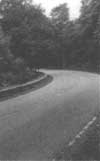
The curvilinear alignment of Skyline Drive and its flanking guard walls gracefully follow the mountainous topography, enhancing the park experience along the road. —Bill Faust, HAER, 1996 | ||
| 1955 | Visitation to Shenandoah and Skyline Drive exceeds 1.5 million a
year. Mission 66 planning foreshadows future development to a "modern" design standard. | |
| 1957 | Work on stone guard walls resumes in the South District between Simmons and Rockfish gaps. | |
| 1958 | The abandoned dining hall at Dickey Ridge is converted into a
visitor's center. Repair work includes addition of a concrete liner to Marys Rock Tunnel begins. | |
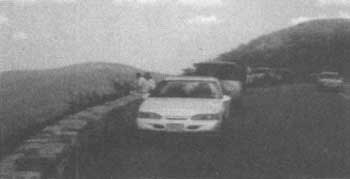
Scenic overlooks and vistas at frequent intervals are integral and essential aspects of Skyline Drives design, offering visitors to Shenandoah a sequential panorama of scenery. —Bill Faust, HAER, 1996 | ||
| 1961 | The portion of the Blue Ridge Parkway between Jarman and Rockfish
Gaps is transferred to Shenandoah, increasing the length of Skyline
Drive from 97 tor 105.5 miles. A new highway interchange and entrance station are constructed at Thornton Gap, and the Panorama area is redeveloped. | |
| 1974 | A new entrance station and grade separation structure are constructed at Swift Run Gap. | |
| 1983 | The Federal Lands Highway Program initiates a major rehabilitation of Skyline Drive. including the replacement of unsafe original guard walls and failed culverts. | |
| 1996-97 | The Historic American Engineering Record (HAER) documents Skyline
Drive. 1996 Skyline Drive listed on the National Register of Historic Places. | |
| Introduction | Acadia | Blue Ridge Parkway | Chickamauga and Chattanooga | Colonial Parkway | Generals Highway | George Washington Memorial Parkway | Great Smoky Mountains | Mount Rainier | Rock Creek and Potomac Parkway | Shenandoah's Skyline Drive | Southwest Circle Tour | Vicksburg | Yellowstone | Yosemite |
